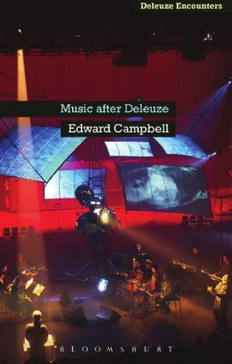
Music after Deleuze PDF
Preview Music after Deleuze
Music After Deleuze Deleuze encounters Series Editor: Ian Buchanan, director of the Institute for Social Transformation Research, University of Wollongong, Australia The Deleuze Encounters series provides students in philosophy and related subjects with concise and accessible introductions to the application of Deleuze’s work in key areas of study. Each book demonstrates how Deleuze’s ideas and concepts can enhance present work in a particular field. TiTles available in The series: Cinema After Deleuze, Richard Rushton Philosophy After Deleuze, Joe Hughes Political Theory After Deleuze, Nathan Widder Theology After Deleuze, Kristien Justaert Space After Deleuze, Arun Saldanha Music After Deleuze edward Campbell LONDON • NEW DELHI • NEW YORK • SYDNEY Bloomsbury Academic An imprint of Bloomsbury Publishing Plc 50 Bedford Square 1385 Broadway London New York WC1B 3DP NY 10018 UK USA www.bloomsbury.com Bloomsbury is a registered trade mark of Bloomsbury Publishing Plc First published 2013 © Edward Campbell, 2013 Edward Campbell has asserted his right under the Copyright, Designs and Patents Act, 1988, to be identified as Author of this work. All rights reserved. No part of this publication may be reproduced or transmitted in any form or by any means, electronic or mechanical, including photocopying, recording or any information storage or retrieval system, without prior permission in writing from the publishers. No responsibility for loss caused to any individual or organization acting on or refraining from action as a result of the material in this publication can be accepted by Bloomsbury Academic or the author. British Library Cataloguing-in-Publication Data A catalogue record for this book is available from the British Library. ISBN: HB: 978-1-4411-0181-5 PB: 978-1-4411-5702-7 ePDF: 978-1-4411-7348-5 ePub: 978-1-4411-3759-3 Library of Congress Cataloging-in-Publication Data Campbell, Edward, 1958– Music after Deleuze / Edward Campbell. pages cm. – (Deleuze encounters) Includes bibliographical references and index. ISBN 978-1-4411-5702-7 (pbk. : alk. paper) – ISBN 978-1-4411-0181-5 (hardcover : alk. paper) – ISBN 978-1-4411-3759-3 (ebook (epub) – ISBN 978-1-4411-7348-5 (ebook (pdf) 1. Music–Philosophy and aesthetics. 2. Deleuze, Gilles, 1925–1995–Aesthetics. I. Title. ML3800.C166 2013 780.1–dc23 2013016929 Typeset by Deanta Global Publishing Services, Chennai, India For Gill and Michael vi Contents Acknowledgements viii Introduction 1 1 Music, difference and repetition 3 2 Producing new music: Rhizomes, assemblages and refrains 35 3 Rethinking musical pitch: The smooth and the striated 67 4 Thinking musical time 99 5 A Deleuzian semiotics of music 133 Conclusion 163 Notes 169 Bibliography 175 Index 187 Acknowledgements many thanks to Ian Buchanan for asking me to write this book and for his editorial support and to Rachel Eisenhauer and Subitha Nair from Bloomsbury Publishing for facilitating the smooth running of the project and for answering my queries. Thanks to Nick Nesbitt and Arnfinn Bø-Rygg, who read the proposal and responded with great generosity. Thanks to Cambridge University Press for allowing me to cite material that I have published previously. I am grateful to the School of Education at the University of Aberdeen for granting me 6 invaluable months of research leave. Thanks, finally, to Björn Heile, Suk-Jun Kim, Ian Russell, Pete Stollery and Chris Fynsk for helpful consultations on small but significant points of detail. Published English translations of texts have been used where available, unless otherwise noted. All other translations are by the author, unless otherwise noted. As is customary, I take responsibility for any unnoticed errors within the text. Introduction The philosopher Gilles Deleuze was not at all a musician and certainly not a music theorist. This fact notwithstanding, this book is predicated on the notion that many of his concepts and ideas can be of great value in rethinking music today. Composer Pascale Criton, who participated in Deleuze’s seminar for several years, and who advised him on musical matters, states that despite not producing a book on music as he had done on cinema, painting and literature, ‘it nevertheless occupies a privileged place in [his] thought’ (Criton 2005). Many of his writings contain significant references to composers, compositions and musical ideas in ways that go well beyond the anecdotal or the incidental, and music is for Deleuze absolutely implicated with thought and, at its best, is indicative of new directions for thought that are arguably uncapturable in any other medium. For Deleuze, philosophy concerns above all the creation of concepts, concepts that enable us to think differently. Despite the rich implication of music and thought in his writings, this book is concerned less with what he wrote about music and more with how his philosophical concepts may be productive for rethinking music. The book has five chapters, each of which is focused on a discrete Deleuzian concept or pair/group of concepts. Each chapter has a similar format in which the specific topic is introduced in a musical context, followed by a summary of related philosophical material from Deleuze’s solo writings or his collaborations with Félix Guattari. This in turn leads to a series of discussions of how the philosophical concept[s] in question may relate to music. In Chapter 1, we consider how Deleuzian concepts offer interesting ways of thinking about difference, repetition and variation in a range of musics including Western art music from Beethoven to Boulez, jazz improvisation and aspects of popular and sacred music.
